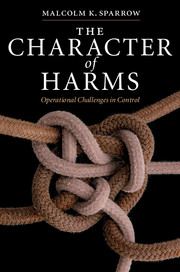Book contents
- Frontmatter
- Contents
- List of figures
- Acknowledgments
- Introduction
- Part I The nature of the control task
- 1 Which way up, and does it matter?
- 2 A different type of work
- 3 Defining problems: setting the scale
- 4 Defining problems: picking the dimensions
- 5 Patterns of thought and action
- 6 Puzzles of measurement
- 7 Structures, protocols, and interactions
- Part II Special categories of harms
- Conclusion
- Index
4 - Defining problems: picking the dimensions
from Part I - The nature of the control task
Published online by Cambridge University Press: 06 July 2010
- Frontmatter
- Contents
- List of figures
- Acknowledgments
- Introduction
- Part I The nature of the control task
- 1 Which way up, and does it matter?
- 2 A different type of work
- 3 Defining problems: setting the scale
- 4 Defining problems: picking the dimensions
- 5 Patterns of thought and action
- 6 Puzzles of measurement
- 7 Structures, protocols, and interactions
- Part II Special categories of harms
- Conclusion
- Index
Summary
The discipline of paying more attention to the harm itself, and less attention to existing control structures, counts in picking the dimensions as much as in choosing the size. One wants to find dimensions which properly reflect the essence of the harm itself, not those that reflect the essence of existing control structures.
There is a rather different but more familiar sense in which risks are understood to be multi-dimensional. That idea, already familiar within the risk literature, concerns the consequences of a harm, and the fact that one event might have several different types of consequence associated with it. An occupational injury, for example, brings both economic costs (for the worker and for the company) and consequences in terms of health and suffering. The same is equally true for terrorist attacks and natural disasters, although the list of consequence categories for such major events is much longer. For corruption, harmful consequences can include loss of efficiency, misallocation of public resources, deliberate official neglect of public protections, damage to democracy through the production of public cynicism about politics, and even the possibility of leading to regime instability. Certainly, in tackling harms or risks, one ought to be mindful of all the foreseeable consequences, especially where losses are experienced by multiple classes of victim and in different ways.
Information
- Type
- Chapter
- Information
- The Character of HarmsOperational Challenges in Control, pp. 93 - 100Publisher: Cambridge University PressPrint publication year: 2008
